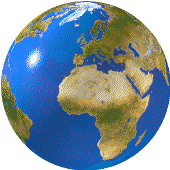CAMBRIDGE FORECAST GROUP UPDATE: CLIMATE AND DEVELOPMENT ADDITIONAL PERSPECTIVE JULY 2013
July 31, 2013 at 3:40 pm | Posted in Africa, Books, CFG, Development, Earth, Ecology, Economics, Financial, Globalization, Science & Technology, Third World, World-system | Leave a comment
A Remark on Climate Change and Third World Development
Let’s suppose that scientific evidence clearly shows at some point that carbon emissions into the atmosphere have to be severely curtailed. The developed economies are now “locked into” into various physical, infrastructural and economic patterns, which are “CO2 emission intensive”, centralized power grids, automobileization, chemical and energy intensive agriculture, fossil fuel generation of electricity. For example, the gains in CO2 emission reduction that could be realized from the use of biofuels is limited by the fact that the production of the crops to be used for biomass energy is itself energy intensive and thus creates greenhouse gas emissions. In the underdeveloped countries, on the other hand, there are large sectors of agriculture, both subsistence and commercial, which have not, as yet, modernized. The use of crops from such sectors affords a much greater reduction of greenhouse gas emissions. For example, according to the Center for Energy and Environmental Studies at Princeton University, the percentage of total electricity generated by utility companies that could have been produced from sugar cane alone using advanced gas turbines is 14.9% in Asia, 19.2% in Africa, 45.1% in Latin America and 200% in Oceania.
To take another example, the lack of centralized power grids in many areas of the Third World has the potential of rendering profitable many forms of energy that would not be as profitable in a developed economy, photo-voltaics, wind, geothermal and others. According to J. C. Hourcade (1981, see footnote below), in many parts of the developing world, the new forms of renewable energy, specifically biogas, photovoltaics, solar, ponds, and geothermy, would already be competitive, for such uses as:
– cooking, especially in rural areas;
– agricultural irrigation;
– hot water heating in temperate and cold regions;
– pumping water;
– agricultural machinery and commercial vehicles.
He maintains that, “on the whole modern sources of renewable energy have a market potential covering 40% of final demand” and, therefore, “new renewable energy energies no longer appear as the energy of the distant future, but as the more appropriate to solve the present crisis in rural areas.”
In fact, from the point of view of climate change, the less developed a country is, the more advantages it has in terms of environmentally sustainable development. For example, given the exigencies of climate change, and the law of comparative advantage, Central America and Africa should specialize in energy-intensive heavy industry. This is because Central America has geothermal power and Africa has local hydropower (see Samir Amin, Accumulation on a World Scale, 1974).
Footnote:
Jean-Charles HOURCADE:
Hourcade, J.C., 1981, Prospect of Third World countries energy demand: a comparative analysis of CIRED’s and IIASA’s results, International Institute for Applied Systems Analysis (IIASA), Laxenburg, Austria.
HOURCADE, (J.C.), 1981, “Energy development styles and capital requirements in Third World countries”, Development, Journal of the Society for International Development, n° 2.
CFG Comment on this footnote:
World Climate Bank
A “world climate bank” would allow industrialized countries to purchase emission rights from less-developed nations. The revenues would enable poor countries to finance environmentally friendly economic development.
Industrialized countries could buy “emission rights” from less-developed countries if they want to continue emitting higher levels of CO2.
A “world climate bank” would allow industrialized nations to buy emissions quotas from countries with lower levels of CO2 output. Estimates show that the global trade in emissions quotas could generate annual revenues of between €30 billion and €90 billion ($45 billion and $129 billion). That money could then be used to help the world’s poorest countries to finance environmentally friendly economic development.
Methane hydrate
Methane traps heat up to 20 times more effectively than carbon dioxide, though it remains in the atmosphere for a shorter time. Scientists warn a leak of methane could be catastrophic to the environment.
Methane hydrate is already a threat, regardless of whether energy companies begin drilling for it. A paper published earlier this month in the journal Nature said a release of a 50-gigatonne reservoir of methane under the East Siberian Sea could accelerate climate change and cost the global economy up to $60 trillion. And that could happen solely due to warming temperatures in the Arctic.
Fracking
Hydraulic fracturing is the fracturing of rock by a pressurized liquid. Some hydraulic fractures form naturally—certain veins or dikes are examples. Induced hydraulic fracturing or hydrofracturing, commonly known as fracking, is a technique in which typically water is mixed with sand and chemicals, and the mixture is injected at high pressure into a wellbore to create small fractures (typically less than 1mm), along which fluids such as gas, petroleum and brine water may migrate to the well.
Some analysts have portrayed fracking as a technology (a la “cold fusion”) that can generate environmentally sustainable growth in the developed countries independent of Third World growth.
We disagree for three reasons.
Fracking can contaminate drinking water with toxic chemicals. (2) The methane released by fracking, has a far more potent greenhouse effect than CO2. (3) Even if fracking makes the West energy independent, Western growth ultimately needs markets in the developing countries.
Comment:
Fracking thus represents a “misplaced autarky” dream. The world economy is a certain kind of “traffic jam” which needs a new global growth pathway to exit the gridlock. This means global systemic change. Obama in 2009 made his Cairo Speech, attended the G20 Pittsburgh Economic Conference and the Copenhagen Climate Conference in December. He was groping towards such inclusive global systemic change in these three places but failed to deliver.
More Background:

CAMBRIDGE FORECAST GROUP GLOBAL PERSPECTIVE
CFG LAWRENCE FEINER YOUTUBE INTERVIEW
GLOBALIZATION AND THE ENVIRONMENT
OLD GLOBAL LOCOMOTIVE VERSUS NEW: CURRENT TRAFFIC JAM
Global crude oil price of Indian Basket increases to US$ 111.59/bbl on 03.09.2013
Effects of Diluted Bitumen on Crude Oil Transmission Pipelines
BIOFUEL POLICY AND PALM OIL 2013
CO-GENERATION STRATEGIES AND GHG
CLIMATE AND DEVELOPMENT KNOWLEDGE
CARBON-DIOXIDE EMISSIONS: U.S. ENERGY-RELATED
ISLAMIC FINANCE AND LOW-CARBON DEVELOPMENT:
Islamic finance nears its big breakthrough in Africa
Islamic banking has grown rapidly around the world but the industry remains in its infancy in Africa; however that might be set to change, presenting the African banking market with a huge opportunity for growth, according to Wasim Saifi, Global Head of Islamic Banking, Consumer Banking, Standard Chartered Saadiq.
Dubai to launch global Islamic economy summit
The Dubai Chamber of Commerce and Industry will launch the first Global Islamic Economy Summit in Dubai in November. The conference is aimed at bringing together leading thinkers and policy makers from around the world.

WORLD ISLAMIC BANKING CONFERENCE
FINANCIAL TIMES OCT 16: AFRICA SUKUK FINANCE
ISLAMIC TAKAFUL: GLOBAL GROWTH POTENTIAL
CFG COMMENT: Islamic Finance is roughly speaking a kind of Muslim venture capital for Third World development based on profit-sharing. Low-carbon development is integrable.
Muhammad bin Ibrahim: Role of the Islamic financial system in supporting green technology
by lawrence feiner, richard melson
CAMBRIDGE FORECAST GROUP

